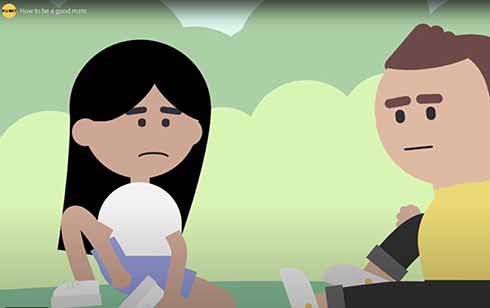 ‘Difficulties become the greatest just when the task should be accomplished.’
‘Difficulties become the greatest just when the task should be accomplished.’
– Mary Glowrey, Medical Doctor, Religious Sister and Servant of God
‘Make hope possible rather than despair convincing.’
– Raymond Williams, Welsh academic and novelist
This has been the most unusual of years. Human history is made up of challenging events. With-in various wars, conflicts, deprivation, disease, and disasters, we have survived together and become better. During this pandemic, we have learned much about our interdependence and solidarity.
The Black Lives Matter protests highlighted the racism and exclusion that accompanies margin-alisation and disadvantage, including that faced by our First Nations people. The people affected by COVID-19 shifted from China, the US, and western Europe to densely populated regions with poor health care systems and extreme poverty in South America, Asia and Africa. There are tough times to come for many on the planet.
In Australia, amid the loss and destruction, we saw the resilience of people and communities. People bonded despite the vicissitudes in our health, economy, and social life. We recognised the power and gift of the human spirit to seek solutions. As the impact of COVID-19 escalated and deescalated, we had to mitigate risks to our lives and livelihoods. Most were able to keep a sense of calm, proportion and balance as we took necessary measures to keep safe and well. We realised we were, after all, serving a greater good. People showed faith, compassion and hope in their cooperation and support of each other.
GREAT LEADERSHIP
There have been great examples of leadership, courage and strength. Families who have been financially and psychologically affected, still love and care for each other as well as they can in these unusual times. Our political and health leaders cooperated extraordinarily well to protect people and our economic security. New businesses formed, and skill competencies developed to respond to changed circumstances. Front-line workers who might not previously have done heroic service, stepped up. The world’s scientists work devotedly in international partnerships to find vaccines and improve treatments.
While support systems for students have varied among schools, it has generally been encouraging how educators have reassured and helped their students and each other navigate a changing world. Improved collaboration and reflective practices, as well as enhanced familiarity with technology and asynchronistic learning helped remodel activities within a more blended learning environment.
The COVID pandemic has been harder for some than others. Some cope well, resourcefully facing challenges. Some struggle, feeling hounded by daily threats. While COVID effects vary greatly across the world and throughout Australia, the reality is seldom dystopian or utopian. Many states and territories are grateful that with appropriate caution, it is largely business as usual. This is so different to Melbourne and elsewhere where life has changed dramatically, and some cannot see much light at the end of the tunnel. In such a sense of crisis, you see the best and worst in people.
BEST AND WORST
There are those who are slack in their responsibilities, or retreat to self-pity, or fail in their care of their neighbour. It is daunting to live with the threat of an ongoing lockdown and forced isolation. Some are at risk or have a family member affected by COVID. Some are devastated by the financial realities of unemployment or loss of business. Experts tell us that there has been an increase in domestic violence and substance misuse in some places. They remind us that many experience loneliness, depression and anxiety.
As COVID has been such a public matter, people tend to talk about their frustrations, there can be some contagion and learned helplessness. Peers and friends, to a large degree, know who is coping and who is not, but lacking face to face interactions can affect us emotionally. Even though people talk to friends online, it is harder to express feelings and receive comfort. When people feel not in control, it is important to talk with a wise person – a friend, family member, counsellor.
Some are naturally resilient, and this trait can shine in a crisis. Others have been enabled to activate their resilience, which will hold them in good stead for the future. Many are not naturally resilient and need extra support currently. It is good to reach out to anyone who might be struggling.
There are great uncertainties ahead and students know there will be changes to society and the economy that will affect further education and career prospects. We are never quite sure how our future will be affected. We adapt and do the best we can, in the circumstances that come our way.
We pray for all who have been affected by this terrible virus, those who have died, who have become sick, those who lost work, those who found isolation terrible. We thank God for the generosity of those at the coal face caring for those affected, looking for ways forward, and making policy decisions for the good of all. We pray that we will move beyond the darker places of our incapacity and impatience, to the warmer, lighter places of springtime.
Fr Peter Hosking SJ is a clinical psychologist and Rector of Saint Ignatius’ College, Adelaide.
Thursday 10 September is RUOK Day. Got a feeling that someone you know or care about it isn’t behaving as they normally would? Perhaps they seem out of sorts? More agitated or with-drawn? Or they’re just not themselves. By starting a conversation and commenting on the changes you’ve noticed, you could help that family member, friend or workmate open up. If they say they are not OK, you can follow our conversation steps to show them they’re supported and help them find strategies to better manage the load. Find out more here.